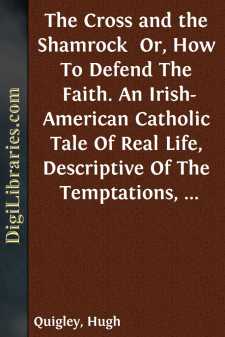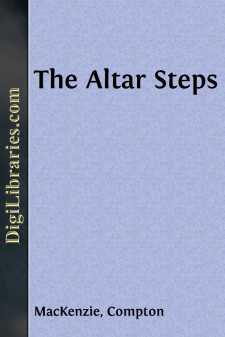Fiction
- Action & Adventure 180
- Biographical 15
- Christian 59
- Classics 6965
- Coming of Age 5
- Contemporary Women 3
- Erotica 8
- Espionage/Intrigue 12
- Fairy Tales, Folklore & Mythology 236
- Family Life 169
- Fantasy 117
- Gay 1
- General 596
- Ghost 32
- Historical 808
- Horror 43
- Humorous 160
- Jewish 25
- Legal 4
- Medical 22
- Mystery & Detective 315
- Political 49
- Psychological 41
- Religious
- Romance 159
- Sagas 11
- Science Fiction 730
- Sea Stories 113
- Short Stories (single author) 537
- Sports 10
- Suspense 1
- Technological 8
- Thrillers 2
- Urban Life 31
- Visionary & Metaphysical 1
- War & Military 173
- Westerns 199
Religious Books
Sort by:
CHAPTER I The crowd gave way and the car glided smoothly up to the curb at the canopied entrance to the church. The blackness of the wet November night was upon the street. It had rained at intervals all day. The pavements shone wetly like new paint in the glimmer of the street lights, and rude shadows gloomed in every cranny of the great stone building. Betty, alone in the midst of her bridal finery,...
more...
by:
John Habberton
As the Capital Express train dashed into the village of Bruceton one bright afternoon, a brakeman passing through a car was touched on the shoulder by a man, who said,— "The man that left this in the seat in front got out three stations back. You don't s'pose he'll want it again an' send back for it, do you?" The brakeman looked at an object which the speaker held up as he...
more...
by:
Hugh Quigley
A DEATH-BED SCENE. A cold evening in the month of January, a drizzling rain storm blowing from the south-west, a cheerless sky, a dull, threatening atmosphere, together with almost impassable roads,—these are the chilling and uninviting circumstances with which, if we pay regard to truth, we must introduce our narrative to our readers. It is usual, with writers of fiction and romance, to preface...
more...
THE BISHOP'S SHADOW Frightened by some alarm of sleep that was forgotten in the moment of waking, a little boy threw back the bedclothes and with quick heart and breath sat listening to the torrents of darkness that went rolling by. He dared not open his mouth to scream lest he should be suffocated; he dared not put out his arm to search for the bell-rope lest he should be seized; he dared not...
more...
CHAPTER I ——Lord Angelo is precise;Stands at a guard with envy; Scarce confessesThat his blood flows, or that his appetiteIs more to bread than stone.Measure for Measure. Scarcely had the Abbey Bell tolled for five minutes, and already was the Church of the Capuchins thronged with Auditors. Do not encourage the idea that the Crowd was assembled either from motives of piety or thirst of information....
more...
CHAPTER I There is an assize-town in one of the eastern counties which was much distinguished by the Tudor sovereigns, and, in consequence of their favour and protection, attained a degree of importance that surprises the modern traveller. A hundred years ago its appearance was that of picturesque grandeur. The old houses, which were the temporary residences of such of the county-families as contented...
more...
by:
Harold Frederic
CHAPTER I No such throng had ever before been seen in the building during all its eight years of existence. People were wedged together most uncomfortably upon the seats; they stood packed in the aisles and overflowed the galleries; at the back, in the shadows underneath these galleries, they formed broad, dense masses about the doors, through which it would be hopeless to attempt a passage. The light,...
more...
CHAPTER I One afternoon during the first weeks of October, 1869, while wind, dust, and rain were struggling each for supremacy in the streets, a small yellow brougham, swung in the old-fashioned style on cumbersome springs and attached to a pair of fine greys, was standing before the Earl of Garrow's town residence in St. James's Square. The hall clock within that mansion chimed four, the...
more...
THE AUTHOR TO THE READER A la sueur de ton visaige,Tu gagnerais ta pauvre vie.Après long travail et usaige,Voicy la mort qui te convie.* THIS quaint old French verse, written under one of Holbein's pictures, is profoundly melancholy. The engraving represents a laborer driving his plow through the middle of a field. Beyond him stretches a vast horizon, dotted with wretched huts; the sun is sinking...
more...
by:
Anthony Trollope
PREFACE. The writing of prefaces is, for the most part, work thrown away; and the writing of a preface to a novel is almost always a vain thing. Nevertheless, I am tempted to prefix a few words to this novel on its completion, not expecting that many people will read them, but desirous, in doing so, of defending myself against a charge which may possibly be made against me by the critics,—as to which...
more...











